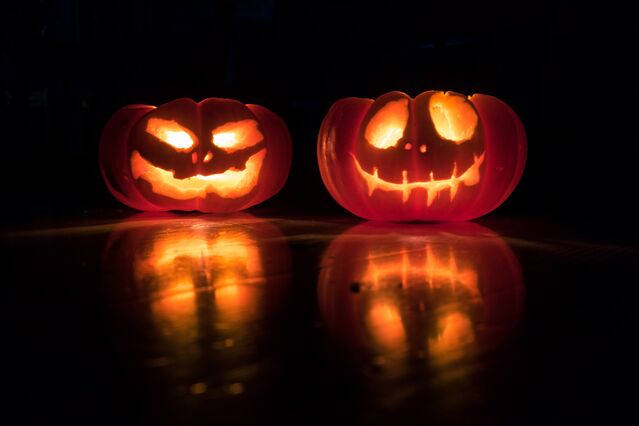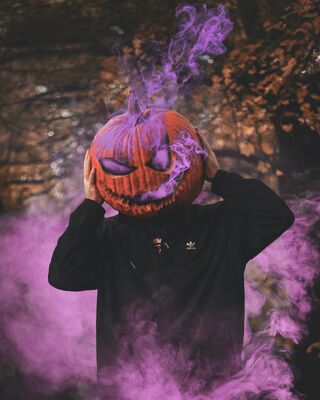Anxiety
Why Do People With Anxiety Love Halloween?
7 reasons why this overlap may not be as odd as it seems.
Posted October 30, 2022 Reviewed by Tyler Woods
Key points
- Some people who live with anxiety may be drawn to Halloween.
- Halloween prompts play and can normalize fear.
- Halloween may offer a simulation of fear that evokes a sense of control
I’ve had a love for spooky things since I was a child. While I didn’t know it at the time, I can pretty much trace my anxiety back to childhood as well. It wasn’t until recently that I realized this overlap may seem odd. Not everyone who lives with anxiety is drawn to scary things, but a lot of us, even those of us with a diagnosis, share a fascination for the eerie. When I step back and look at this as a mental health counselor educator, I realize that may make much more sense than one may think. Here are seven reasons to help you solve the mystery of why people who run anxious still run toward all things spooky.

1. Play
Many Americans associate scary things with Halloween and the wider spooky season of autumn. Even with an expected dip from COVID-19, a majority of Americans participate and have done so for years. Costumes, imagination, and stepping out of daily norms conjure the perfect potion for playfulness. Imaginative play has been linked to mental wellness, and can be a self-care strategy well into adulthood. Further, immersive play may serve as a distraction from one’s anxious tendency of obsessing about the past or future.
2. Nostalgia
For those who have celebrated Halloween throughout the years, it may evoke nostalgia for simpler times of ease. This may be particularly likely for those who developed anxiety in later years and especially so for those without childhood trauma. Even for those who choose to partake as an adult and did not as a child, this permission to play allows the inner child to explore and for the adult self to reap the benefits.
3. Familiarity
Halloween prompts us to think about our fears. For folks who live with anxiety, they don’t need a day on the calendar for that reflection, their minds are often there. Halloween may be seen as an incremental (and from a critical standpoint) unnecessary addition of fear to an anxiously overloaded plate, but people living with anxiety are well-acquainted with fear.
Think about it this way, when you learn to ride a bike it’s often an intimidating experience. A few bumps and bruises later, you find your balance. As the years go by, the risks often become overshadowed by your seemingly second-nature abilities. Repeated exposure can reduce the perceived threat, and may even summon a sense of ease.

4. Normalization
On a typical day, people who live with anxiety disorders are artfully balancing their thoughts, aiming to discriminate the fine line between reflection and rumination. In a world that generally sends the message that it is unacceptable to have emotions, much less to explore your deepest fears, people who live with anxiety tend to be isolated with their often obsessive inner dialogue. Yet, on Halloween, all things eerie rise from the darkness and the experience of being frightened is normalized.
Horror writer Heinrich von Wolfcastle, whose works include The Contritionist and The Ones in Between, notes, "Society values conventionality, and there are countless ways in which our bosses, our communities—even our friends and families—can use shame as a way to ensure conformity to mainstream expectations. I like to think that Halloween is one day a year where we get to let go and celebrate being ourselves—idiosyncrasies and peculiarities and all."
5. Connection
Fear being normalized in spooky season creeks the door to connection open. Individuals who live with anxiety may feel an invitation to address the monsters under the bed. This may be an inward exploration, but it may also morph into an external form as well. Some may lean into metaphors and archetypes to connect with themselves and others through the portals of costume, décor, television, books, and movies. Wolfcastle highlights that The Phantom of the Opera teaches us that people become the monsters we've made them out to be, and Frankenstein reminds us that it's society—people and their over-identification with labels—that's truly to be feared.
Gary Vaughn, an Associate Professor of English at the University of Cincinnati, highlights that beneath the guise of the horror genre, shows such as "American Horror Story" offer social commentary. In this season of "Freakshow", for example, entranced viewers are made to ponder the notion of normalcy, change, diversity, and, of course, fear. This ancient underworld of the horror genre has allowed for provocation for centuries, and for someone who runs anxious, it may allow a safe and indirect realm to face their fears.
6. Empowerment
Many who live with an anxiety disorder experience struggles with the unknown. To some degree, Halloween offers a relatively controlled exposure to fear with safety being known. For example, when you choose to watch a scary movie, you expect to be frightened. By viewing the trailer, or sometimes simply hearing the title, you set your expectations of what type of alarm to anticipate, such as a ghost sauntering in the background or a creep peeking into the window flush at the center of the screen. I don’t know about you, but when I walk up to a (decorated) haunted house in the month of October, I expect some ghoulish creature to pop out at me. When it does, there is a sense of relief. Similarly, people who live with anxiety get to experience a closed cycle of anticipation, approach, startle, and relief. The decision to spin through this may feel empowering, and that sense of accomplishment may also spill over into one’s perceived abilities to manage anxiety.
7. Preparation
Along with his colleagues, John Johnson, Professor Emeritus of Psychology at Penn State University, found that horror film fans had less psychological distress during COVID-19. More specifically, those who watched prepper films (think zombie apocalypse) were more prepared for the pandemic. Generally, those who were curious had greater resilience during the pandemic. With these findings in mind, exposure to scary movies, similar to the controlled encounter concept noted above, offers an opportunity to explore curiosity at minimum and offer simulations for real-life experiences at best.
I hope that these examples have helped you to understand why people who experience anxiety may love Halloween. Remember, everyone’s experience is unique. This by no means posits that all who have anxiety will be drawn to horror, or that it is healthy. What one may masquerade during spooky season may be a valid and overwhelming fear for another. Above all, please recall these two Halloween reminders: (1) mental health illness is never a joke, and (2) just because someone lives with anxiety doesn’t mean they are fearful of everything.




